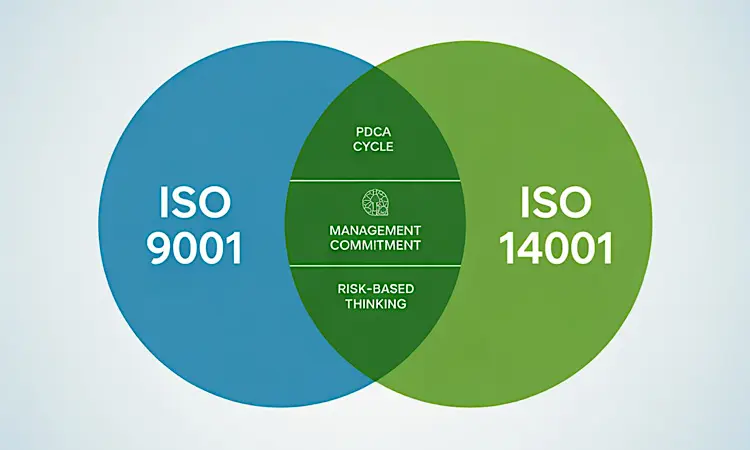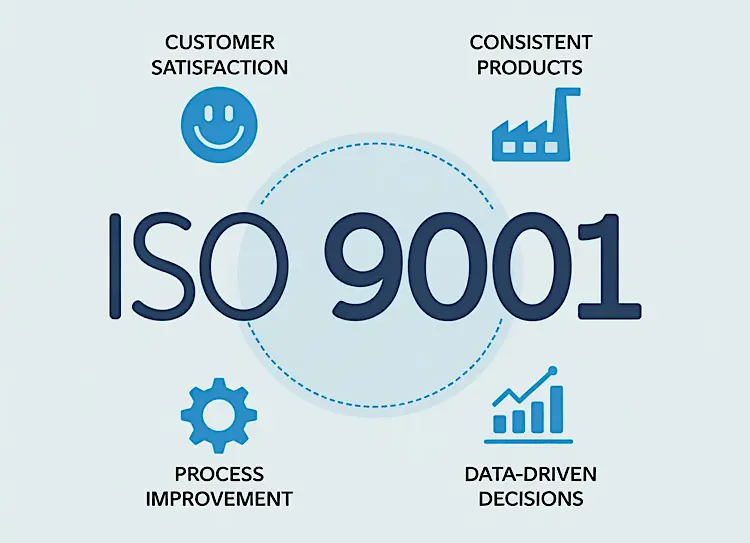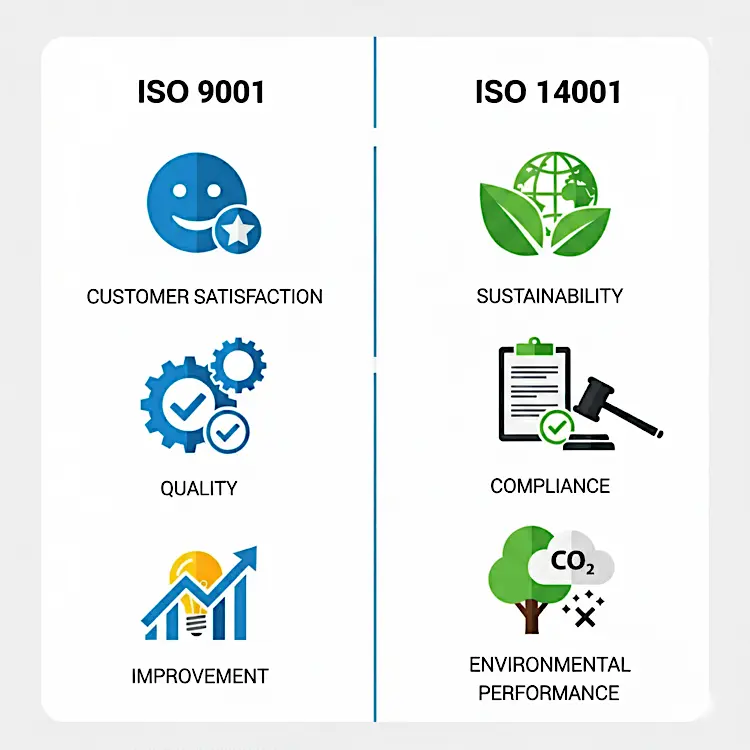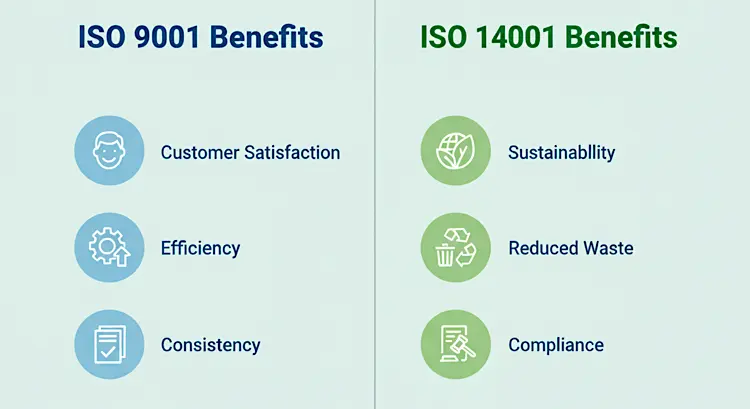ISO 9001 vs 14001: Key Differences, Similarities, and How to Choose
2 October 2023
ISO 9001 vs 14001 is one of the most common comparative searches for organizations looking to improve operations. How do they compare? Both standards are published by the International Organization for Standardization (ISO), yet they serve different goals. ISO 9001 focuses on quality management, while ISO 14001 targets environmental management.
Many companies struggle to decide which certification to pursue first. Others want to integrate both standards to improve efficiency and credibility. If you are considering ISO certification, our ISO 9001 Certification Service provides expert support and simple, cost-effective solutions.

What is ISO 9001?
ISO 9001 is the world’s most widely used quality management standard. It sets requirements for a Quality Management System (QMS).
Core objectives include:
Delivering consistent products and services
Increasing customer satisfaction
Improving processes through risk-based thinking
Enhancing decision-making with data
ISO 9001 applies to all industries, from manufacturing to services. Over one million organizations worldwide are certified, making it the most recognized ISO standard.
Businesses often use the ISO 9001 Certification Toolkit to simplify documentation and fast-track compliance.

What is ISO 14001?
ISO 14001 sets requirements for an Environmental Management System (EMS). It helps companies minimize environmental impact, meet legal obligations, and improve sustainability.
Key objectives include:
Reducing waste and energy use
Preventing pollution
Meeting environmental regulations
Improving resource efficiency
ISO 14001 applies to industries with direct environmental impact, such as construction, manufacturing, logistics, and energy. Globally, over 300,000 organizations are certified.
While ISO 9001 builds trust with customers, ISO 14001 strengthens environmental credibility with regulators and communities.
ISO 9001 vs ISO 14001: Main Differences
When comparing ISO 9001 vs ISO 14001, the scope and focus are the clearest differences:
ISO 9001: Customer satisfaction, quality control, continuous improvement
ISO 14001: Environmental performance, sustainability, compliance with environmental laws
Other differences:
ISO 9001 requires process monitoring and customer feedback
ISO 14001 requires environmental risk assessment and control measures
ISO 9001 improves internal operations and product consistency
ISO 14001 reduces environmental footprint and legal risks
Both standards use the Annex SL structure, which makes them easy to integrate.

ISO 14001 vs ISO 9001: Similarities
Despite different focuses, ISO 14001 vs ISO 9001 share several similarities:
Both follow the Plan-Do-Check-Act (PDCA) cycle
Both require management commitment
Both emphasize risk-based thinking
Both require internal audits and corrective actions
Both can be certified by accredited bodies
This alignment means companies often implement both together. Integrated systems cut costs, reduce duplicate processes, and improve efficiency.
ISO 9001 vs 14001 vs 45001
Businesses often extend their comparison beyond ISO 9001 vs 14001 to include ISO 45001.
ISO 9001: Focuses on quality and customer satisfaction
ISO 14001: Focuses on environment and sustainability
ISO 45001: Focuses on occupational health and safety
Together, these three standards cover the core pillars of responsible business: quality, environment, and safety.
Organizations that adopt all three gain a strong reputation, reduce risks, and win contracts with clients who demand full compliance.
ISO 9001 vs 14001 vs 45001 Clauses
ISO standards follow a shared 10-clause structure under Annex SL. However, the content of these clauses differs. For example:
Clause 4 (Context of the Organization): ISO 9001 looks at customer needs; ISO 14001 looks at environmental impact; ISO 45001 looks at workplace safety.
Clause 6 (Planning): ISO 9001 requires quality objectives; ISO 14001 requires environmental objectives; ISO 45001 requires hazard assessments.
Clause 9 (Performance Evaluation): ISO 9001 reviews customer satisfaction; ISO 14001 monitors emissions and waste; ISO 45001 tracks incident rates.
Understanding these differences helps companies build an integrated management system without duplication.
ISO 9001 vs ISO 14001 Differences in Certification Benefits
Certification benefits vary depending on the standard:
ISO 9001 certification helps:
Win more contracts
Improve customer satisfaction
Increase efficiency and reduce costs
ISO 14001 certification helps:
Demonstrate environmental responsibility
Meet regulatory requirements
Reduce waste and resource use
Both certifications show commitment to improvement and compliance, giving businesses a competitive edge.

Why Businesses Choose Both Standards
Many organizations pursue both certifications because they complement each other.
Example: A manufacturer certified to ISO 9001 ensures product quality, while ISO 14001 ensures sustainable production. Together, they meet customer demands and regulatory expectations.
Companies often reduce implementation costs by combining training and audits. Our ISO 9001 Consulting Service can guide businesses through integrated certification efficiently.
Commercial Advantage of ISO 9001 and ISO 14001
Investing in ISO certification is not just about compliance, it drives real business results.
Customer trust: Many buyers demand certified suppliers
Market access: Certifications open doors to global contracts
Cost savings: Improved efficiency reduces waste and errors
Reputation: Being certified improves brand image
Case studies show businesses achieve up to 20% efficiency gains and significant reductions in customer complaints after ISO 9001 certification. Similarly, ISO 14001-certified companies often cut energy costs by 5–10% annually.
How to Get Certified
The certification process follows these steps:
1. Gap Analysis – Compare current processes to ISO requirements
2. Documentation – Create policies, manuals, and records
3. Implementation – Train employees and apply controls
4. Internal Audit – Check compliance before external audit
5. Certification Audit – Accredited body evaluates compliance
For faster results, businesses use toolkits like the ISO 9001 Certification Toolkit, which reduce preparation time by up to 80%.

ISO 9001 vs 14001: Which One Should You Choose?
The decision depends on your business goals:
Choose ISO 9001 if your priority is quality and customer satisfaction
Choose ISO 14001 if your priority is environmental responsibility and compliance
Choose both if you want to improve quality, environment, and market reputation together
If unsure, schedule a free consultation with our experts via the Home Page.
Conclusion: ISO 9001 vs 14001 for Your Business
ISO 9001 vs 14001 is not about which is better, it is about which fits your business goals. ISO 9001 ensures quality and customer trust. ISO 14001 ensures sustainability and regulatory compliance.
Both standards add value, and together they create a powerful management system. To make certification faster and simpler, explore our ISO 9001 Certification Toolkit.
For professional guidance, visit our ISO 9001 Certification Service.


